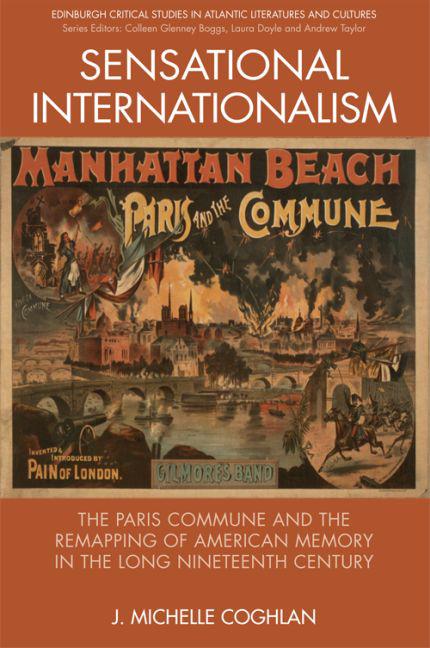 Sensational Internationalism
Sensational Internationalism Book contents
- Frontmatter
- Contents
- List of Illustrations
- Acknowledgments
- Series Editors’ Preface
- Introduction: Revolutionary Preoccupations: Or, Transatlantic Feeling in a Radical Sense
- 1 Framing the Pétroleuse: Postbellum Poetry and the Visual Culture of Gender Panic
- 2 Becoming Americans in Paris: The Commune as Frontier in Turn-of-the-Century Adventure Fiction
- 3 Radical Calendars: The Commune Rising in Postbellum Internationalism
- 4 Tasting Space: Sights of the Commune in Henry James's Paris
- 5 Restaging Horror: Insurgent Memories of the Commune in the 1930s
- Epilogue: Barricades Revisited – The Commune on Campus from FSM to SDS
- Notes
- Bibliography
- Index
2 - Becoming Americans in Paris: The Commune as Frontier in Turn-of-the-Century Adventure Fiction
- Frontmatter
- Contents
- List of Illustrations
- Acknowledgments
- Series Editors’ Preface
- Introduction: Revolutionary Preoccupations: Or, Transatlantic Feeling in a Radical Sense
- 1 Framing the Pétroleuse: Postbellum Poetry and the Visual Culture of Gender Panic
- 2 Becoming Americans in Paris: The Commune as Frontier in Turn-of-the-Century Adventure Fiction
- 3 Radical Calendars: The Commune Rising in Postbellum Internationalism
- 4 Tasting Space: Sights of the Commune in Henry James's Paris
- 5 Restaging Horror: Insurgent Memories of the Commune in the 1930s
- Epilogue: Barricades Revisited – The Commune on Campus from FSM to SDS
- Notes
- Bibliography
- Index
Summary
What America means is the gospel for which his life stands, his only tant-mieux to show for his time in Paris.
Eugene Savidge, The American in Paris (1896)In the late 1990s, PrestonSpeed Publications began re-issuing the adventure fiction of popular fin-de-siècle British boys’ writer G. A. Henty for an American homeschooling audience. Several more small presses followed suit, and soon the “smashing success” of Henty's sales in the homeschooling market began to garner attention in such prominent publications as The New Criterion, The Wall Street Journal, and The New York Times even as the books themselves became the centerpiece of the popular “Robinson Curriculum” for homeschoolers. This resurgence of Henty mania in America was itself marketed as and fueled by an investment in déjà vu; publishers like Robinson Books and Lost Classics take pains to remind parents that these boys’ books were wildly popular with US readers at the turn of the twentieth century, while Evangelical ministry sites like the Vision Forum, as if taking a page from Theodore Roosevelt, claimed to “rebuild a culture of courageous boyhood” through, among other things, the reading of Henty.
However, Henty's appeal for US homeschoolers also has its roots in the successful packaging of his formulaic historical fictions as history; indeed, as one publisher puts it, they altogether “alleviate the need for [history] textbooks” – a claim that itself rehashes Henty's own turn-of-the-century marketing schemes. Although much critical work remains to be done on Henty's renewed purchase for American boys, the case of cultural déjà vu surrounding his fictions runs still deeper, for as a rising generation of homeschoolers turn to Henty to learn about history, we seem to be revisiting many of the debates about democracy and revolution, manliness and empire, that originally framed the popularity of – and often were explicitly enacted within – the genre of historical romance and boys’ adventure fiction in the US in the 1890s.
In this chapter, I read Henty's recently re-issued but altogether critically overlooked 1895 title, A Woman of the Commune, alongside several now-forgotten American bestsellers of the period: Edward King's boys’ book, Under the Red Flag: Or, the Adventures of Two American Boys During the Paris Commune (1895), Robert W. Chambers's The Red Republic: A Romance of the Commune (1895), and Eugene Savidge's The American in Paris:
- Type
- Chapter
- Information
- Sensational InternationalismThe Paris Commune and the Remapping of American Memory in the Long Nineteenth Century, pp. 52 - 78Publisher: Edinburgh University PressPrint publication year: 2016


